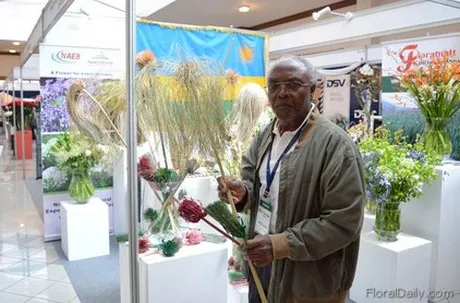
Nsenga showcasing its dried flowers at the National Agricultural Export Board (NAEB) booth at the IFTEX 2016 in Nairobi, Kenya.
Climate
According to Nsenga, Rwanda has a great climate for year round cultivation of flowers. "It has a temperate tropical highland climate; all year, the temperatures lies between 12 and 28 degrees Celsius. Besides that, there is plenty of water, it only needs to be cleaned before it can be used on flowers. And we have many different altitudes, this country is known as the land of a thousand hills. The average altitude is 2000 meters."
Start-ups attempted
The potential of floriculture in Rwanda has been known for several years now and the government is heavily encouraging local and foreign investors to start a business in floriculture. "Investors are given almost everything for free to start", says Nsenga. "Around twelve years ago, some local investors started to grow roses in a high tech greenhouse. However, four years later the farm had to stop as it didn't work. In my opinion, it was not thought through carefully. Some Europeans advised and installed high tech greenhouses, but they did not consider the fact that the country is ‘landlocked’. It is not easy to transport and export the products as, compared to Kenya or Ethiopia, Rwanda does not have direct flights to Amsterdam for example. Besides that, I was told the people engaged in this project were not professionals in growing flowers", says Nsenga. Lately, however, a new rose growing project has been put in place, and the roses are being harvested at the moment. And two or three more projects with other flower varieties are being initiated as well. "We will see how all this will work out. But definitely money and high-tech will not do everything."
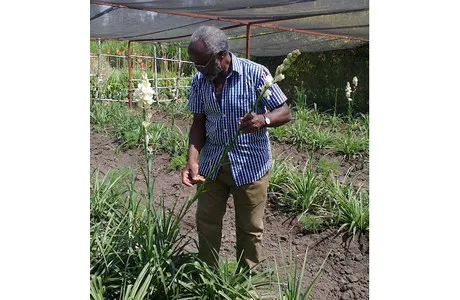
Nsenga trying out new flower varieties on his experimental/demonstration plot in Rwanda.
Niche market
So, who are needed then to make floriculture thrive in Rwanda? ''We need people with knowledge about how to work, plan and grow flowers and people with the capacity and inner drive to do things differently than in Kenya, and Ethiopia, and elsewhere. It is very easy to start a business in Rwanda, but if investors will grow the same crops as they do in neighbouring countries, they will probably not succeed. I personally think and dream of developing a niche market for Rwanda floriculture. As the land is 'locked', we need to invent something that people want and something that they want to come and get it. At the last IFTEX 2016 in Nairobi, Kenya, for example, I had brought and exhibited tuberoses that I cultivate and dye here in Rwanda. This flower is bigger than the tuberose found at the regular marketplace and a Saudi Arabian man visited the booth and he wanted to have it. He was looking for such a type for a long time. These are the kind of things we need to find and cater for: original products and original buyers and customers from all over the world.''
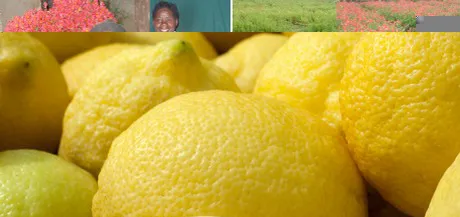
Flowers grown in Rwanda. Upper photos of Rwandan Alstroemerias and bottom pictures of Rwandan Agapanthus.
Products with potential
Nsenga is neither a grower nor a floricultural expert, but a product developer. So, he does not have the expertise of growing flowers, but he has the insight in what new products to introduce to which corresponding market. Since two years ago, for example, he has been initiating Rwandan prospect farmers to grow multi-colored Zantedeschia and it seemed to be a success. "They grow very quickly and they do not need much: no greenhouse or other techniques are necessary, just a bit of fertilizers, water, and… minimal care! And due to the exceptional climate, just like their cousins Zantedeschia aethiopica, colored Zantedeschia can as well be cultivated year round, if planting time is well planned." So, after this 'trial' he asked the National Agricultural Export Board (NAEB) to invest around 40,000 euros in multi-colored Zantedeschia tubers. These were handed out to selected prospect farmer artisans, and it turned out to be another success. "Two years ago, I brought some of the wildly growing Zantedeschia aethiopica to the auction in Aalsmeer, the Netherlands, and they sold very well. I guess professionally grown multi-colored Zantedeschia would do even much better at the auction!"
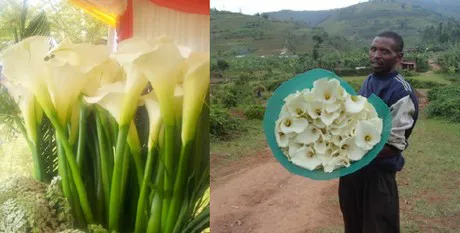
Zantedeschia aethiopica
Currently, Nsenga is working on developing a market for dehydrated products. "There is a huge business for dried flowers and plant materials, and there are not many people in this business. This is for example a niche market in which Rwanda can distinguish itself from the surrounding East African market. I have already introduced a line of dehydrated flowers, plus the dried papyrus for example."
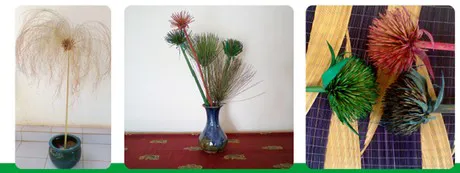
Dried papyrus.
Local and regional market
According to Nsenga, there is not only a potential to enter the world market with Rwandan flowers, but also the local market in Rwanda, the regional market in East Africa, and the entire continent. "People in Rwanda – and in sub-Saharan Africa in general - are not used to flowers, they hardly use them. Flowers are not part of our traditional culture. Flowers are now used only in weddings and funerals and especially by the younger urban and westernized generation. So, there is much to gain in offering this new clientèle what it is desperately looking for." In addition, Nsenga also sees immediate opportunities to export Rwandan flowers throughout Africa. “And from our unique geographical position, endowed as we are with all natural amenities, each East African country could create its own niche supply market, and all complementing each other for export. A real force in perspective!”
For more information
Ninaf Consultancy
Francois Nsenga
Email: nsenga@ninafconsult.co.rw
www.ninafconsult.co.rw
